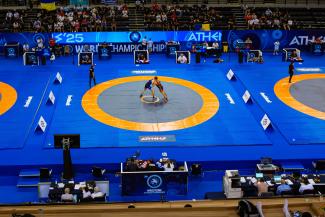United World Wrestling Joins World Taekwondo in Worldwide Peace Initiative
Thursday, November 1, 2018 - 22:03 By United World Wrestling Press

CORSIER-SUR-VEVEY (November 1) – United World Wrestling has joined with World Taekwondo and the Taekwondo Humanitarian Foundation (THF) to sign a landmark Memorandum of Understanding (MoU) to promote humanitarian, peace and development-supporting activities around the world.
United World Wrestling president Nenad LALOVIC met with World Taekwondo President Chungwon CHOUE the World Wrestling Championships in Budapest on October 22 to sign the agreement.
The agreement will allow full cooperation and information exchange between the three organisations. They aim to commit to developing close cooperation in the following areas:
- Promoting sport as a powerful vehicle towards peace, social development and integration of vulnerable populations;
- Uniting forces in offering sport for development and peace activities, in particular in THF’s existing Azraq Taekwondo Academy in Azraq Refugee Camp, Jordan, and potentially other locations worldwide;
- Exchanging and sharing of expertise, know-how, information and publications.
To help support the launch of the initiative United World Wrestling is also planning to deliver a coaches course in Jordan to train local coaches who will conduct wrestling sessions in the Azraq Refugee Camp.
“We have followed the development of this humanitarian fund and have seen what it can achieve and look forward to joining World Taekwondo’s effort to diversity athletic opportunities in the camps.” said Lalovic. “We trust that wrestling and taekwondo will add light to the lives of the children in these refugee camps.”
World Taekwondo President and THF Chairman, Chungwon Choue shared similar sentiments during the meeting. “At World Taekwondo, our motto is, ‘Peace is more precious than Triumph.’ This landmark agreement reflects our commitment to that ideal and is another key step forward in contributing to a more peaceful future through sport.”
“We have always been clear that we are open to working with other International Federations to ensure we can help as many people in need as possible,” said Choue. “We are looking forward to working with UWW to learn from them and to share our experience and expertise. Through our collaboration, we will be able to make a real difference to the lives of those that need it most.”
The terms of mutual assistance, financial responsibilities, and related activities of any project or activities implemented from the Memorandum will be mutually discussed and agreed upon in writing by all parties prior to their initiation.



Share your thoughts.
Comments